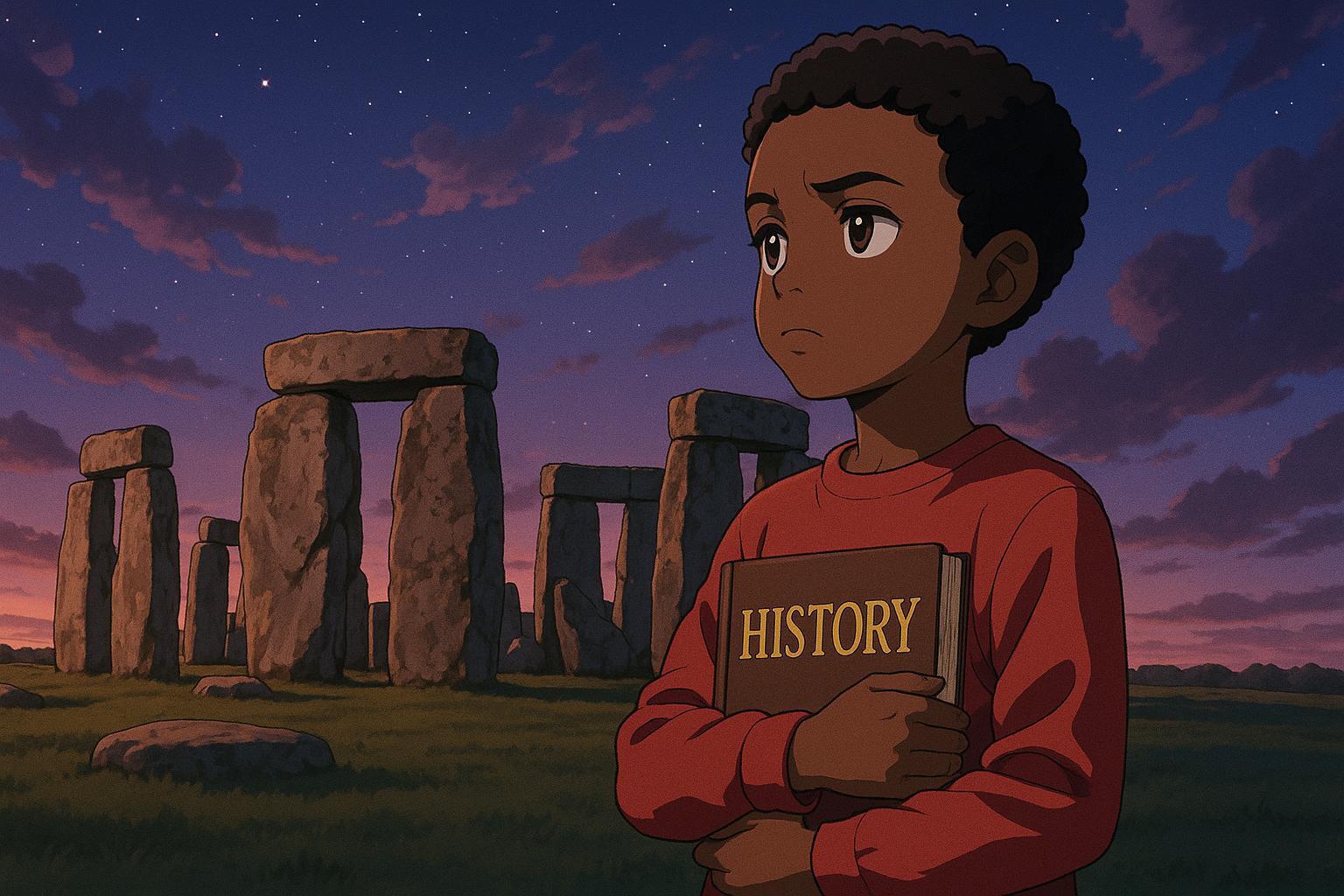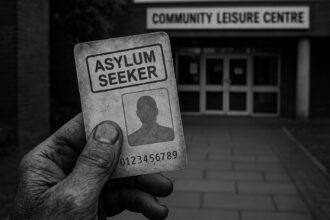Atinuke’s children’s book claims Stonehenge was built by black Britons, igniting controversy over historical accuracy and curriculum content amid shifting educational priorities.
The debate surrounding the origins of one of Britain’s most iconic monuments, Stonehenge, has recently intensified, particularly framed within the broader context of evolving educational curricula. The children’s book “Brilliant Black British History,” authored by Atinuke, posits that Stonehenge was constructed by black Britons during a time when the population of Britain was predominantly black. This claim has sparked criticism, not only for potentially oversimplifying historical narratives but also for being labelled as “hotly contested and outside mainstream historical thinking” by the Policy Exchange think-tank.
According to the book, Britain was a black country for over 7,000 years before the emergence of white populations, a narrative that seeks to place black history at the forefront of British identity. The assertion aligns with recent findings that ancient Britons, including those associated with Stonehenge, likely had darker skin. Research analysing 348 ancient genomes indicates that lighter skin tones became more prevalent over time, largely influenced by migration patterns. However, this data does not directly support the claim of the book but adds a layer of complexity to the discussion about race and historical identity.
While Atinuke’s work aims to provide an empowering narrative for younger readers, its reception has not been universally positive. Critics argue that it distorts history by presenting controversial interpretations as fact. A report from Policy Exchange identified that changes to school curricula, influenced by movements such as Black Lives Matter, often err on the side of radical inclusivity, resulting in instances where contested narratives are taught without sufficient context or critical analysis. The report finds that, although efforts to include varied perspectives in history lessons might have positive elements—such as highlighting stories from the women’s suffrage movement—there’s a concern that this might come at the cost of rigour and a well-rounded historical education.
In fact, the research points to a decline in the teaching of classical British military history, with examples like the Battle of Trafalgar and the Battle of Agincourt being omitted from many curricula. Fewer than one in ten students now learn about these pivotal moments, indicating a shift in focus that some believe dilutes the core components of national heritage. The think-tank advocates for a balanced approach that encourages diverse historical narratives while maintaining rigorous academic standards.
Supporters of Atinuke’s book and similar educational resources argue that they serve to correct long-standing gaps in the narratives traditionally presented in schools, thereby fostering a more inclusive understanding of British history. They advocate for the importance of diversity in historical accounts, suggesting that failing to acknowledge the contributions and presence of black Britons obscures pivotal aspects of the nation’s past.
As this debate continues, it raises critical questions about how history is taught and the implications of curricular changes. Are we moving towards an inclusive history that accurately reflects Britain’s multicultural identity, or are we at risk of rewriting history in a way that sacrifices complexity for ideological narratives? The answer may depend largely on educators’ ability to strike a balance between accuracy and inclusivity, ensuring that future generations receive a well-rounded education while appreciating the diverse tapestry that makes up British history.
The discussion surrounding the treatment of Stonehenge in educational materials exemplifies the broader challenges faced in reconciling historical fact with contemporary societal values, highlighting the need for ongoing dialogue and critical engagement with our past.
Reference Map
1: Paragraph 1, 2, 5
2: Paragraph 2
3: Paragraph 5
4: Paragraph 5
5: Paragraph 2
6: Paragraph 2
7: Paragraph 4
Source: Noah Wire Services
- https://www.express.co.uk/news/uk/2056848/stonehenge-row-black-people-monument – Please view link – unable to able to access data
- https://www.telegraph.co.uk/news/2023/09/18/stonehenge-built-by-black-britons-childrens-history-book/ – An article from The Telegraph discusses the children’s book ‘Brilliant Black British History’ by Nigerian-born British author Atinuke. The book claims that Stonehenge was built by black Britons during a time when Britain was predominantly a black country. It also asserts that every British person descends from migrants, with the earliest Britons being black. The book is aimed at readers aged seven and above and presents a chronological overview of black people’s presence in Britain, starting with the Cheddar Man, the oldest human remains found in Britain, who is described as having skin ‘as dark as dark can be’.
- https://www.gbnews.com/news/woke-news-row-children-book-stonehenge-brilliant-black-british-history – GB News reports on the controversy surrounding the children’s book ‘Brilliant Black British History’ by Atinuke. The book claims that Stonehenge was built by black Britons during a time when Britain was a ‘black country’. The article highlights criticism from commentators who accuse the book of rewriting British history and presenting inaccurate information to children. The book is intended for readers aged seven and over and aims to provide a historical overview of black people’s presence in Britain.
- https://www.express.co.uk/news/uk/2056848/stonehenge-row-black-people-monument – An article from the Daily Express discusses the controversy over the children’s book ‘Brilliant Black British History’ by Atinuke. The book claims that Stonehenge was built by black people during a time when Britain was predominantly a black country. The article also mentions the Policy Exchange think-tank’s report, which criticizes the book’s claims as ‘hotly contested and outside mainstream historical thinking’. The think-tank warns that such narratives are increasingly infiltrating classrooms, leading to the teaching of contested interpretations of history as fact.
- https://www.breitbart.com/politics/2023/09/20/stonehenge-built-when-britain-was-a-black-country-claims-childrens-history-book/ – Breitbart reports on the children’s book ‘Brilliant Black British History’ by Atinuke, which asserts that Stonehenge was built when Britain was a ‘black country’. The article highlights the book’s claims that Britain was predominantly black for over 7,000 years before white people arrived and that the most famous British monument, Stonehenge, was constructed during this period. The book is aimed at children aged seven and above and presents a chronological history of black people’s presence in Britain.
- https://www.independent.co.uk/bulletin/news/ancient-britons-dark-skin-stonehenge-africa-b2708695.html – The Independent reports on a study suggesting that ancient Britons who built Stonehenge likely had dark skin. The research challenges previous beliefs about the timing of skin tone changes in Europe, indicating that dark skin was prevalent even during the Iron Age. The study analyzed 348 ancient genomes and found that lighter skin tones became more common as humans migrated to regions with less sunlight, aiding vitamin D production. The change occurred more gradually than previously thought, with dark skin persisting for thousands of years after humans’ migration from Africa.
- https://www.ox.ac.uk/news/2018-08-02-new-light-shed-people-who-built-stonehenge – A University of Oxford research collaboration sheds new light on the people who built Stonehenge. The study suggests that some of the individuals buried at the site had moved with and likely transported the bluestones used in the early stages of the monument’s construction, sourced from the Preseli Mountains of west Wales. The research combined radiocarbon dating with new developments in archaeological analysis to investigate the lives of those buried at Stonehenge, revealing that at least 10 of the 25 people studied did not live near the monument prior to their death.
Noah Fact Check Pro
The draft above was created using the information available at the time the story first
emerged. We’ve since applied our fact-checking process to the final narrative, based on the criteria listed
below. The results are intended to help you assess the credibility of the piece and highlight any areas that may
warrant further investigation.
Freshness check
Score:
8
Notes:
The debate seems current, referencing ongoing discussions about educational curricula and recent books like ‘Brilliant Black British History.’ However, the core discussions around Stonehenge’s origins are not new, but the context of evolving educational perspectives keeps the topic fresh.
Quotes check
Score:
6
Notes:
There are no direct quotes in the narrative, which makes it difficult to verify originality or authenticity.
Source reliability
Score:
7
Notes:
The narrative originates from a well-known publication, The Express, but the reliability can vary depending on the specific topics covered. The inclusion of references to Policy Exchange and educational debates adds credibility.
Plausability check
Score:
8
Notes:
The claims about Stonehenge and historical narratives are plausible within the context of ongoing debates about history and inclusivity. However, the narrative around black Britons constructing Stonehenge is controversial and not widely accepted.
Overall assessment
Verdict (FAIL, OPEN, PASS): OPEN
Confidence (LOW, MEDIUM, HIGH): MEDIUM
Summary:
The narrative is part of ongoing discussions about historical narratives and inclusivity, but its claims about Stonehenge are controversial and not supported by mainstream historical thinking. The freshness of the topic is high due to recent educational debates, but the lack of direct quotes limits verification.













